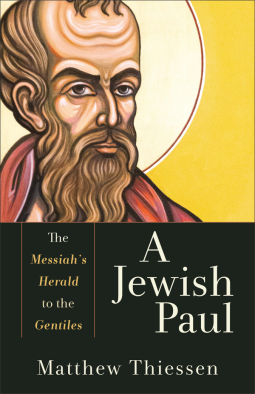
A Jewish Paul
The Messiah's Herald to the Gentiles
by Matthew Thiessen
This title was previously available on NetGalley and is now archived.
Send NetGalley books directly to your Kindle or Kindle app
1
To read on a Kindle or Kindle app, please add kindle@netgalley.com as an approved email address to receive files in your Amazon account. Click here for step-by-step instructions.
2
Also find your Kindle email address within your Amazon account, and enter it here.
Pub Date Aug 22 2023 | Archive Date Sep 05 2023
Baker Academic & Brazos Press | Baker Academic
Talking about this book? Use #AJewishPaul #NetGalley. More hashtag tips!
Description
Respected New Testament scholar Matthew Thiessen offers an important contribution to this discussion. A Jewish Paul is an accessible introduction that situates Paul clearly within first-century Judaism, not opposed to it. Thiessen argues for a more historically plausible reading of Paul. Paul did not reject Judaism or the Jewish law but believed he was living in the last days, when Israel's Messiah would deliver the nations from sin and death. Paul saw himself as an envoy to the nations, desiring to introduce them to the Messiah and his life-giving, life-transforming Spirit.
This new contribution to Pauline studies will benefit professors, students, and scholars of the New Testament as well as pastors and lay readers.
Advance Praise
“Scrupulous in its fairness to Judaism and immensely helpful in correcting noxious Christian misrepresentations of it, this readable and engaging little book succeeds remarkably in locating Paul, the Christian apostle to the gentiles, within the Judaism in which he was formed and which he never thought he had altogether left. Both Christians and Jews have much to gain from reading A Jewish Paul. Highly recommended!”—Jon D. Levenson, Albert A. List Professor of Jewish Studies, Harvard University
“Ever since E. P. Sanders’s pioneering work, the role of Judaism has been an important dimension of work on Paul’s letters. In this very readable volume, Thiessen provides the reader with a portrait of Paul that takes his Jewishness with the seriousness it deserves. The debate on many issues he engages will not be brought to closure, but he charts directions that all scholars will need to consider going forward.”—Gary A. Anderson, Hesburgh Professor of Catholic Thought, University of Notre Dame
“Since the middle of the twentieth century, debates have raged in academia over the question of Paul’s relationship to Judaism. Yet these debates remain scarcely known to the public. Matthew Thiessen seeks to remedy that situation in this book, and he succeeds admirably in clear and cogent prose. But the book is not merely an introduction to debates over Paul and Judaism; Thiessen does not plod neutrally through various scholarly positions. He makes a strong case that Paul remained fully and firmly within Judaism from birth to death. Thiessen is not the first to make this argument, but he does it with a notable twist: he argues that the best framework for understanding the historical Paul lies in the portrait bequeathed to us by the author of Luke-Acts. It is a compelling argument, sure to hold the attention of seasoned scholars while providing uninitiated readers a clear introduction to this important debate.”—Pamela Eisenbaum, Iliff School of Theology
“God bless Matthew Thiessen! It is so difficult to give a historically compelling account of the apostle Paul that is, at the same time, helpful to readers of Christian Scripture and, on top of all that, readable and accessible. I know because I have tried. Now, though, I will be very happy simply to refer people to this wonderful book.”—Matthew V. Novenson, University of Edinburgh
“This is an excellent introduction to Paul. It is concise, clear, and nuanced. It will be a real feast to scholars, students, and interested readers. The book can be used in various contexts (seminaries, religious studies programs, or church Bible studies). I cannot recommend Thiessen’s A Jewish Paul enough for serious and important conversations between Jews and Christians.”—Ronald Charles, associate professor, Department for the Study of Religion, University of Toronto
“In A Jewish Paul, Matthew Thiessen offers an introduction to Paul that is genuinely fresh, thoroughly stimulating, and highly accessible. Drawing on some of his signature contributions to Pauline studies as well as new material, Thiessen offers provocative readings that challenge long-standing interpretations that fail to recognize Paul’s identity as a first-century Jewish thinker. All who consider themselves students of Paul—whether the beginner or the scholar—will find themselves engrossed in this book’s pages.”—Michael Patrick Barber, professor of theology and Scripture, Augustine Institute Graduate School of Theology
“The apostle Paul may need no introduction. Few people—perhaps only Jesus himself—are as widely known as the man from Tarsus. In fact, Paul may be too well known, and his robust reputation may prevent us from seeing him with historical or theological clarity. Matthew Thiessen offers students and scholars alike an invaluable resource: an accessible-yet-innovative introduction to a Jewish Paul, the herald of Israel’s Messiah to the non-Jewish nations.”—Rafael Rodríguez, professor of New Testament, Johnson University
“Excellent scholars who work at the cutting edge of their field and who have a mastery of its history (as does Thiessen on Pauline studies) are sometimes unable to communicate that field to those outside of it. This book is an outstanding exception. It is as readable as it is masterful. This is fortunate, because its message could not possibly be more important if Christians and New Testament scholars alike are to finally escape the gross misreadings of Paul that continuously put Jewish lives in danger of violence.”—Sara Parks, assistant professor in religious studies, St. Francis Xavier University
Available Editions
| EDITION | Other Format |
| ISBN | 9781540965714 |
| PRICE | $26.00 (USD) |
| PAGES | 208 |
Available on NetGalley
Average rating from 6 members
Featured Reviews
One need not hear that many Christian sermons before encountering the notion that the Bible can be summarized something like this:
"God created Adam and Eve but they rebelled. After a lot of rebellion, he chose Abraham and his descendants to be the people he would rescue from their rebellion. All they had to do was follow the Law given on Sinai and they would continue to stay in his good graces. But this salvation-by-works was basically an exercise in futility, and nobody could do it throughout the generations of Israel. So then eventually God decided to call it and send Jesus to save people apart from works, and this time salvation would be based on grace instead. That's why the majority of Paul's letters in the New Testament are contrasting law and grace, explaining why people don't need to be circumcised, and why it's dangerous to rely on works of the law. It's why he gets legitimately angry at people who suggest that Gentiles can be saved in Jesus as long as they keep the Law."
The general impression you walk away with here is that the Old Testament scheme was self-evidently bad and that the message of the New Testament is mostly just, "Stop trying to earn your salvation by being a good person," and is thus quite obviously an easier, better, more palatable message than that musty old idea of obeying the Law.
It doesn't take that many years of reading the Bible, though, to realize that this narrative is kind of a fiction and doesn't really make sense of the big picture of Scripture. It's not that it's really altogether wrong as much as it's like a funhouse mirror distortion of reality. There have been very many scholars who have written against this general narrative, and probably the most recent and notable of which is NT Wright. Wright's argument, infamously, is that the problem with the Old Testament is "race, not grace," his point being that the New Testament is an answer to the ethnocentrism of ancient Israel rather than any perceived or real problems with Law-keeping.
Wright's perspective is a helpful corrective insofar as it recognizes that God's grace was always foundational to his salvation of his people, that Gentiles were always welcome at his table, that his people had always been called to participate in his outward mission, and that the New Testament doesn't subvert any of that. Jesus explicitly says of his ministry, "Do not think that I have come to abolish the Law or the Prophets" (Mt 5:27).
Ironically, this approach still lands in a fairly antisemitic place. If we go with Wright we might not think that the problem with ancient Israel was their Law-keeping, but we do still see Israel as problematic. It's just that the problem has shifted from legalism to ethnocentrism.
Into this fraught territory wades Matthew Thiessen with his new work, A Jewish Paul: The Messiah's Herald to the Gentiles. As he says in his conclusion, his hope is to provide a way of reading Paul "that seeks to defuse Christian anti-Judaism and supersessionism." How? Thiessen suggests that "the key to unlocking Paul's writings is to embed him within the larger Jewish world of his day." In other words, he notes that debates about circumcision, the Law, and how Gentiles should relate to Yahweh were pre-existing debates to which Paul was merely adding his perspective in light of his belief that Jesus was the long-awaited Messiah. This was a debate that was happening before Jesus was born, and it was a debate that continued into Paul's day.
The move that some authors make at this point is to suggest that Judaism and Christianity are therefore equally valid ways to Yahweh, but this is not the direction Thiessen goes. Instead, he turns to Romans 11:28-32 to argue that while Israel is still God's people, there has been a partial, temporary hardening of their hearts induced by God himself so as to provide a window of time for Gentiles to be grafted into that people after which the partial hardening will be removed.
What is that partial hardening? It's not some kind of works righteousness, and neither is it ethnocentrism. It's simply a failure to believe that Jesus is their Messiah. The Law and the Prophets should have pointed them directly toward Jesus and yet somehow in their zeal to keep God's word, they missed the crucial piece. Thiessen offers this analogy: "This situation is like the person who is so engrossed in discerning the details of a map that they fail to make the final turn to get to their destination."
This all raises many questions, then, about how to read this or that passage in Paul, and that's what the majority of Thiessen's book endeavors to answer (though not in an exhaustive way). Indeed, the book is astonishingly short compared to most works on this specific topic. His expressed goal is simply to introduce people to reading Paul this way rather than to provide a thoroughgoing dissertation on every last objection someone might have. Whether you find his proposal compelling or not is up to you, but at minimum I do recommend reading through this short book and chewing on his argument. I still am!
DISCLAIMER: I received a copy of this book from the publisher for the purpose of a fair, unbiased review.
As I've begun following various rabbis and other Jews on social media, I've become increasingly aware of the (sometimes unconscious) antisemitism that is too frequently found in our churches, in the way we pit the New Testament against the Hebrew Bible, and definitely in the way we speak about Paul, the Pharisees, and the Jewish establishment in Jerusalem in the 1st century CE. As such, I very much appreciated this brief primer from Thiessen that pushes back against the far-too-frequently anti-Jewish interpretations that seem to dominate. I found his reasoning sound and his arguments appear to be well-supported. I hope to read more from Thiessen on the subject.
 Christian W, Reviewer
Christian W, Reviewer
One of the most significant topics in Pauline studies since the 1940s has been Paul's relationship with the Jewish world of his time. In the aftermath of World War II, biblical scholars sought to define the ways in which Paul differed from his Jewish predecessors and whether he perceived Christianity as an evolution of Judaism or something distinct. In recent times, the contentious issue of "supercessionism" (whether Christianity replaces Judaism or not) has been a focal point, and numerous monographs, since E.P. Sanders and James D.G. Dunn in the 1970s, have addressed this matter. Among these, Matthew Thiessen enters the discussion with his book, A Jewish Paul: The Messiah's Herald to the Gentiles.
Thiessen argues that Paul's connection to his Jewish brethren is stronger than commonly believed, and he takes a historical approach to explore this relationship. He delves into questions such as whether Paul abandoned Judaism entirely, viewed it as something different, and how Jews and Christians should interact in light of Paul's association with Judaism. To achieve these goals, Thiessen relies on the New Testament canon to reconstruct Paul's worldview, despite the challenge of lacking an autobiography. He also draws from the rest of the New Testament, including Acts.
This historical methodology is the book's primary strength, which many readers will appreciate. Additionally, Thiessen's reliance on the New Testament canon as the basis for his historical reconstruction sets his work apart. While some scholars may not be fully persuaded by Thiessen's conclusions, his well-written and informative arguments, based on the canon, are noteworthy. In the field of Pauline studies, it has become increasingly common to use secondary literature, such as works by N.T. Wright and texts on Second Temple Judaism to study Paul's views. However, Thiessen's emphasis on the New Testament provides a more accessible entry point into the debate, especially for those less familiar with these secondary sources. This aspect and the book's historical and foundational approach elevate A Jewish Paul to a "must-read" status for anyone interested in Pauline studies.
Starting with the premise that Paul is more strongly continuous with his Jewish background, Thiessen proceeds to explore Paul's relationship with contemporary Judaism and the Gentiles. The book is structured clearly and coherently. Initially, Thiessen delves into Paul's identity and the world he inhabited while also examining the diverse history of Judaism. The book's second half explores the relationship between Paul and Judaism concerning the Gentiles and how they interacted. Throughout these discussions, Thiessen delves into how Paul's views relate to Jewish eschatology and missiology and how Gentiles would interact with Jewish Scriptures, practices, and the Messiah. This well-structured approach makes the book easy to follow, allowing readers to follow the argument based on solid organization and concise summaries at the end of each chapter.
It is important to note that A Jewish Paul is an introductory book and, as such, cannot cover all the major details of the debate. With just over two-hundred pages, it inevitably has limitations in scope and depth. While the discussion is not shallow, some readers may desire more in-depth analysis at certain points in the study. However, this book serves as a solid foundation for readers seeking a deeper exploration, and it can lead them to further study with other authors.
In conclusion, A Jewish Paul provides a good introductory exploration of how Paul's life related to Judaism and his understanding of the revelation of the Jewish Messiah. Although it does not delve into the level of an academic volume, it presents various topics with surprising depth and clarity. Even if readers are not entirely persuaded by the central thesis, Thiessen's arguments and introduction to a more Jewish-aligned view of Paul are compelling and warrant engagement.
Having written nearly 1/3rd of the Christian New Testament, it is difficult to ignore the significant contribute by St Paul to Western Christianity. Unfortunately, the 13 or so letters attributed to Paul can be difficult to interpret (Thiessen even notes that the Book of Acts says that many were confused by his teachings). The problem is exacerbated by the fact this we no longer have the same context as his original audience so a straightforward reading may often leads us astray. According to Thiessen, this is particularly true with Paul’s apparent rejection of Judaism that has frequently been used to support the concept of supersessionism, and by extension antisemitism. Placing Paul firmly within an early Jewish milieu under the influence of Greek [Stoic] philosophy can actually provide us with a better understanding of what Paul was trying to do as the Apostle to the Nations (Gentiles).
This is not a new concept for me. Paul is a self described Uber Jew, so after his Road to Damascus “conversion” and apparent rejection of Jewish tradition (for Gentile Jesus followers) has generally been seen as a hard break with the “Judaizers” of his past … except such a believe just doesn’t add up considering his deference to St Peter and the Church in Jerusalem. I have always been uncomfortable with many of the modern interpretations of Paul and have actively sought after an exegesis more in line with how I read the Gospels … this included a number of articles and discussions that attempted to incorporate St Paul’s view of how Gentiles fit within the larger salvific plan of the God of Israel. Thiessen does an excellent job of presented his [academic] argument in language that is clear and accessible to a casual reader with solid support for his positions. Even so, much of the evidence provided is circumstantial, so his conclusions are generally based on a “best fit” paradigm and largely subjective where some readers may not be persuaded of his point of view. This book is a welcome addition to my growing library from which a gain a better understanding of my own faith.
I was reading this book while our small group was studying Romans. I think the group got a little fatigued from me quoting the ideas and thoughts from this brilliant book.
I found this book so valuable for understanding the background and context to Paul’s writings and world view. Particularly useful was how Matthew Thiessen explained how Paul saw the world as being divided into two major groups - Jews and non-Jews. The author also helped me understand that Judaism was not one set of unmoveable beliefs but had variation.
The phrase ‘let’s keep Paul weird!’ was also surprisingly helpful in my efforts to understand the place Paul writes from.
I would highly recommend this book to anyone wanting to develop a deeper understanding of Paul and his writings. It is well written, thought-provoking and nuanced.
Readers who liked this book also liked:
Peter H. Reynolds with Paul A. Reynolds
Children's Nonfiction, Religion & Spirituality















